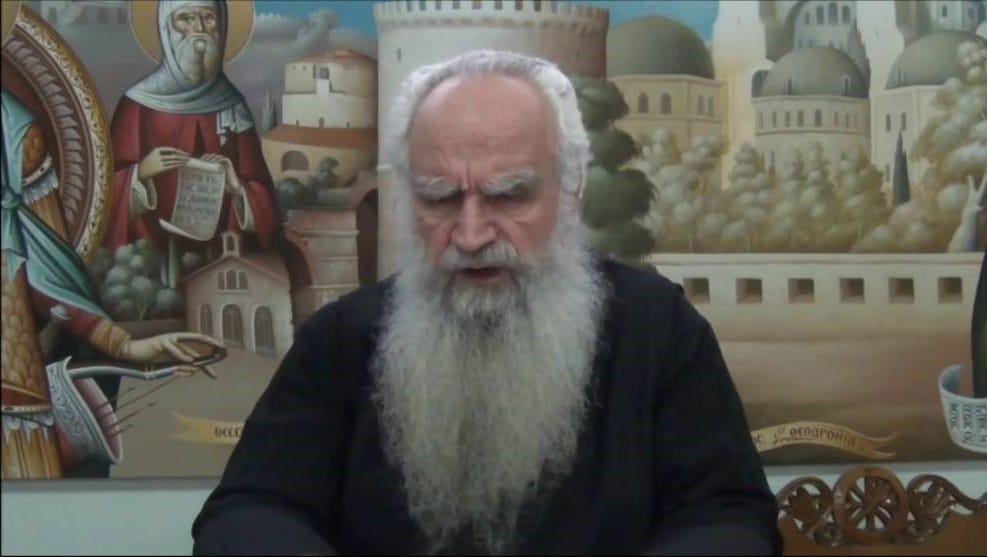Protopresbyter Theodoros Zisis of Thessaloniki, Greece: aerial toll-houses are real
Protopresbyter Theodoros Zisis states that aerial toll-houses are in fact the teaching of the Church and it is a disadvantage that this teaching of the Church is not always taught everywhere to all.
[A biographical introduction of] Protopresbyter Theodoros Zisis, Professor of Patristics, Aristotle University of Thessaloniki:
Fr. Theodoros was born on the island of Thasos, Greece, in 1941. After graduating from the distinguished Ecclesiastical School at Xanthi, he enrolled at the University of Thessaloniki, where he completed both his undergraduate and post-graduate studies. His doctoral dissertation, The Salvation of Man and the World according to Saint John Chrysostom, was supervised by the renowned patrologist Panigotes Chrestou. Serving as a lecturer and subsequently professor of Patristics at AUTh from 1973 until his retirement in 2008, Fr. Theodoros also served as chairman of the Patriarchal Institute for Patristic Studies. Authoring some twenty books on the Fathers as well as numerous pamphlets and articles, he was instrumental in the founding of a number of academic journals (most notably Theodromia) and the organization of several conferences dedicated to the study of the life and works of contemporary saints (including St. Athanasios of Paros, St. Nikodemos of the Holy Mountain, and St. Nektarios of Aegina). In great demand as a speaker, he travels throughout Greece. Fr. Theodoros currently serves as priest at St. Anthony’s Church in Thessaloniki, where he offers seminars every Sunday following the Divine Liturgy.1
Our topic today will be about the teaching of the Church on the toll-houses, which is the term that the Church uses to describe the demons that afflict, interrogate, and examine the souls after their separation from the body, that is, at the hour of death. It is a teaching that, although represented by many Fathers, by sanctioned Fathers, is not well known to Christians.
I have to tell you that even when I finished seminary, I still had not heard about the toll-houses. I hadn’t heard about the toll-houses while being a seminarian. It is not being taught at the seminary. It is a very serious and very valid teaching and council by many Holy Fathers. The reason, however, why it is not being taught is because people don’t want to hear of difficult and unpleasant things which disturb us. But this is to our disadvantage. We must hear of the difficult, and must try to escape the unpleasant. What purpose is there in emulating the ostrich by sticking our heads in the sand in order to not see the danger? It will happen inevitably.
In fact it is in Holy Scripture, as the Lord Himself says: Thou fool, this night they shall require thy soul of thee (Luke 12:20). They seek for it. It is a matter of fact, stated in the Holy Scripture. There are other passages in the Holy Writ. For example, in another verse our Lord says: For the prince of this world cometh, and hath nothing in Me (John 14:30). St. Basil the Great remarks that he found nothing in Christ, because He is sinless. In us, however, he will find something.2
There are myriads of examples which consolidate this teaching on the toll-houses. But they don’t teach it, I repeat, so that we won’t worry and lose our cheerfulness, and so we won’t give up our worldly joy. However, if we had an awareness of what our soul will undergo at this procedure of examination by passing through the toll-houses, we would be more vigilant.
There is another very nice text of St. John of Damascus, which speaks of what I had said immediately after the sermon. Listen to how beautifully he speaks: “The men enlightened by God say that the deeds of men are tested at their final breath as with a scale. If the right side surpasses the other side, it is clear that the one has passed away will be with the angels on the right. [And if the two sides are equal, God’s love for man will surely prevail. But, as the divine men say, if it tips slightly to the left, even then the mercy of God will fill what is missing. Behold, three divine judgements of the Master: the first is just; the second is merciful; the third is supremely good. After these three is a fourth, when the evil deeds are in great excess. Alas, brethren; this judgment is certainly most just, too–justly decreed for the condemned.]”3
We hear the philosophers and the modernized theologians who disparage all these things. But they don’t say anything meaningful. Not whatever such-and-such theologian, and such-and-such secularized bishop and patriarch say. But what do the enlightened say, the saints? The exceptionally enlightened St. Damascene, such a great philosopher, relates what the enlightened ones say. Being enlightened himself, he proclaims what the illuminated say….
I say these things so they can be heard by the theologians and clerics, so they don’t think that these are the words of “illiterate people” about the toll-houses. Very great theologians say these things, very great Holy Fathers.4
-The Departure of the Soul According to the Orthodox Church, Master Reference Edition, pp. 306-308
The entirety of this homily has been uploaded to YouTube in Greek. Not all of the content of the homily is written here.
More biographical information of Protopresbyter Theodoros can be read here: https://www.impantokratoros.gr/theodoros-zisis-biographical-notes.en.aspx
St. Basil the Great, Exegetic Homilies, Homily on Psalm 7, FOTC, vol. 46 (Washington D.C., 1963), pp. 167-168. (PG 29:232C-233A.)
St. John of Damascus (On Those Who Have Fallen Asleep in the Faith), PG 95:272B. (In Greek). Fr Theodoros cites the first two sentences of St. John’s excerpt.
The text here is derived from multiple parts of a homily given at St. Anthony’s Church, Thessaloniki, November 18, 2012; index 00:00-2:30; 22:20-22:50; 27:30-27:45; www.impantokratoros.gr/CC372816.el.aspx



